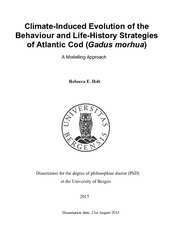| dc.description.abstract | Climate change influences the marine environment, with ocean warming being the foremost driving factor governing changes in the physiology and ecology of fish. At the individual level temperature can directly influence numerous physiology processes in marine fish as well as bioenergetics, having consequences for life-history processes and population level consequences. A primary mechanism through which temperature can affect fish is through respiratory physiology as it has consequences for performance and fitness. The difference between maximum metabolic rate and standard metabolic rate is referred to as aerobic scope, and is suggested to constitute a key limiting process prescribing how fish may cope with or adapt to climate warming. Field data and experiments have demonstrated an array of effects and influences of temperature on Atlantic cod and other marine fish species. This PhD research explores how temperature can influence the life-history and behaviour of Atlantic cod through a theoretical modelling approach. A state-dependent energy allocation model was developed to predict temperature-induced adaptations for the life-histories and behaviour of Atlantic cod, in response to climate warming. The model was parameterised primarily for the North-East Arctic cod stock and then extended to facilitate parametrisation of a further 19 stocks, enabling intra-specific stock comparisons across the North-Atlantic. The model is based on life-history theory, which addresses how an individual should schedule its life to maximise its expected lifetime reproductive output. Energy allocation and investment into growth, maturation and reproduction depends on a number of physiological and ecological factors, such as respiratory physiology and aerobic scope, constraints on body size, environmental variability in prey availability, spawning migration distance, and mortality. These constraints and mechanisms are well justified to the physiology and ecology of the species. By using state-dependent dynamic programming techniques, a model can find optimal energy allocation between growth and reproduction at the individual level as well as simulate lifetime trajectories in a population model under the external driver of increasing temperature. The model predictions provide a number of results important for conservation physiology and fisheries management of Atlantic cod and marine fish species more generally. Firstly the model shows that when predicting the effects of climate change on fish, one should view the species physiology and ecology as a whole, being aware that organisms possess a suite of traits that have co-evolved. Some methods within the literature for predicting the effects of climate warming can be one-sided, focussing on purely physiological or ecological responses, omitting evolutionary considerations. The effects of climate warming on fish are complex, thus an integrated whole organism approach is needed. Secondly, we find for the North-East Arctic cod stock, the effects of climate warming are positive. Increased temperatures were predicted to select for faster lifehistory strategies, increasing growth rates, larger size-at-age and higher reproductive output. Thirdly, our model fills in the gap between respiratory physiology as described by the Oxygen- and capacity-limited-thermal tolerance theory (OCLTT) and how it may influence fitness. We find that optimal temperatures for growth and fitness lie well below that for aerobic scope; and agree in accordance with a recent literature debate, that aerobic scope is a poor predictor of fitness at high temperatures. This has implications for climate change effects, conservation physiology, and the OCLTT theory. Fourthly, we have identified key mechanisms and potential drivers pertaining to the life-history variation across 20 cod stocks in the North-Atlantic. We find that the drivers of intra-specific variation in Atlantic cod could be explained by differences in temperature, seasonality and spawning migration distance between the stocks. Furthermore, when predicting the effects of climate warming on these stocks, the model illustrates how climate warming may influence the life-history strategies of cod in diverse ways. We find that cold-water stocks may fare better and be more resilient under increasing temperature scenarios than their warm-water counterparts. Lastly this PhD research provides a unique life-history modelling tool that can be adapted and extended. Due to the mechanistic modelling framework, the model could be adapted to other marine teleosts, particularly other boreal or temperate species. As we include an explicit respiratory physiology component, it also allows flexibility to include additional drivers, such as the effects of hypoxia on increased respiratory costs as well as the effects of fishing mortality. The integrating effects of multiple drivers are already prominent in the current literature and our mechanistic model could take this further to assess effects on life-history traits. | en_US |
